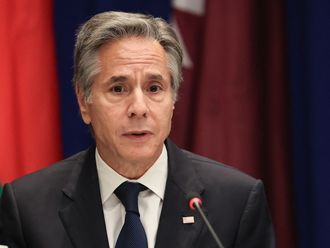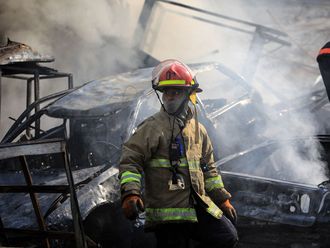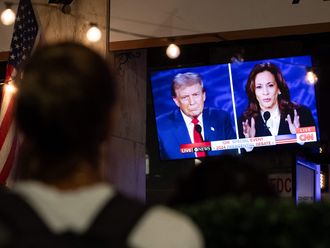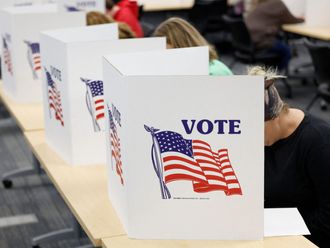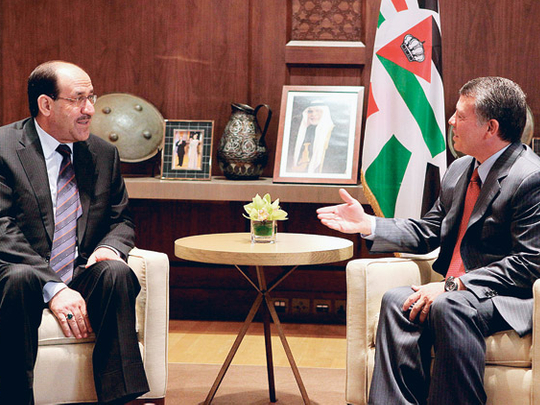
Dubai: Lebanon was the focal point of deliberations amid a series of high-level talks involving Arab leaders on Sunday.
A Saudi-Syrian summit on Sunday mirrored the diplomatic urgency sweeping the Arab world close on the heels of Iranian President Mahmoud Ahmadinejad's visit to Lebanon.
Jordan's King Abdullah II received Iraqi Prime Minister Nouri Al Maliki who is on a regional tour — that will also take him to Iran, Egypt and Turkey — with the aim of rallying support in his bid for a second-term in office.
The talks between the two leaders sought to address the rising tensions in Lebanon, the deadlock over the formation of a new government in Iraq, and the impasse surrounding the Palestinian-Israeli peace talks in the face of Israel's refusal to stop expanding its colonist agenda in the occupied territories.
"There are several complicated issues in the region with no solutions on the horizon," Lebanese MP Ammar Houri told Gulf News.
Yesterday's flurry of diplomacy was "needed, welcomed and essential... there are attempts to have some sort of a light in the dark tunnel," Houri, from Al Mustaqbal party headed by Lebanese Prime Minister Sa'ad Hariri, added.
Syrian president Bashar Al Assad travelled to Riyadh on Saturday for talks with Saudi King Abdullah Bin Abdul Aziz, three days after Ahmadinejad visited Lebanon and demonstrated his support for the resistance group Hezbollah.
High on the agenda at the Riyadh summit were the tensions between current Lebanese Prime Minister Sa'ad Hariri and Hezbollah over the UN-backed tribunal's impending verdict on the assassination of former Lebanese prime minister Rafik Hariri in 2005.
"It is not a secret that there is a concern somewhere from the [upcoming] indictment," Houri said.
Unease about tribunal
Some reports suggest that the tribunal is set to indict members of Hezbollah for Rafik Hariri's murder. Already these reports have heightened tensions in Lebanon that threaten to derail Sa'ad Hariri's national unity government. Hezbollah is part of the government with two ministers.
While media reports say Hariri has offered to play down any indictment linked to rivals Hezbollah and focus only on the individuals involved, Hezbollah has demanded the international tribunal be shut down and that any case be referred to local courts, a demand rejected by the Lebanese government.
Riyadh has extended strong backing to Hariri and endorsed the tribunal, while Damascus has long been close to Hezbollah and the views of both Abdullah and Al Assad assume great significance under the circumstances.
Sa'ad Hariri travelled to Saudi Arabia on Saturday evening "for a previously planned family 48-hour-visit", sources close to him confirmed to Gulf News.
Asked about the possibility of Hariri being involved with the Syrian-Saudi summit, a source said, "this depends on the outcome of the summit. In case he was invited, he is ready."
Tension over the UN tribunal is only one of the factors behind the series of diplomatic parleys over Lebanon, analysts say.
"It is just a factor to be added to other factors related to alliances and ongoing regional movements that are reflected on the Lebanese arena," wrote Lebanese writer Walid Shuqair in the pan-Arab newspaper Al Hayat.
Other factors, according to Shuqair, are the ongoing Iranian-American "under the table contacts" while the American-Syrian relations remains well below the level desired by Syria.
"From following the situation in Iraq, Damascus found itself facing two possibilities, either to join the American-Iranian understanding over Al Maliki and be a partner in or outside it."
Al Maliki's overtures
In Amman, Jordan's King Abdullah II expressed his strong desire to see an Iraqi government formed but withheld public endorsement for Al Maliki's bid for a second term in office.
Al Maliki has been struggling to remain in power since his Shiite alliance narrowly lost the March 7 vote to a rival's Sunni-backed bloc, which Jordan and other Sunni Arab states have supported.
Jordanian officials said King Abdullah II told Al Maliki during a closed-door session yesterday that he backs an Iraqi government that would include all main political blocs. King Abdullah II stressed it was up to Iraqis to choose their government.
Al Maliki's adviser, Ali Al Mousawi, had said the premier would tell Abdullah that none of Iraq's major political constituencies would be excluded from a new government if Jordan backed his second term.
— With additional inputs from agencies


